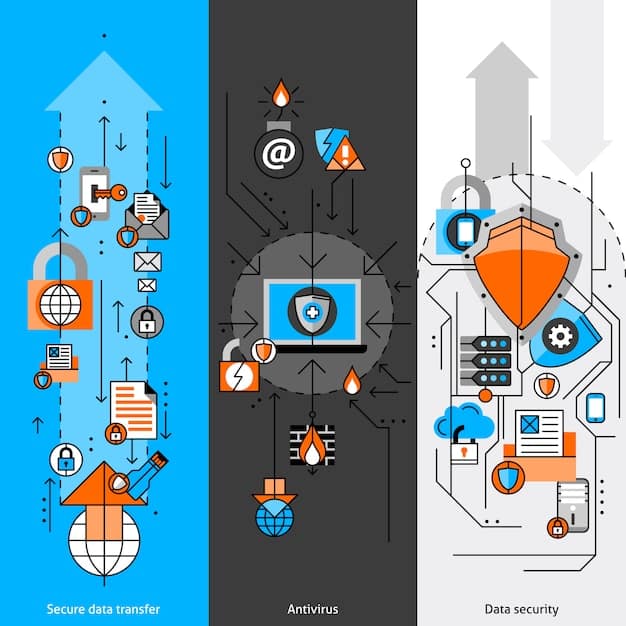AI in National Security: Transforming Operations & Future Challenges

Artificial intelligence (AI) is revolutionizing national security operations by enhancing intelligence gathering, improving cybersecurity, and automating threat analysis, leading to more effective defense strategies and faster response times.
The landscape of **how artificial intelligence is transforming national security operations** is rapidly evolving, presenting both unprecedented opportunities and complex challenges for governments and defense agencies worldwide. AI technologies are increasingly being integrated into various aspects of national security to enhance capabilities and streamline processes.
The Role of AI in Intelligence Gathering
AI is revolutionizing intelligence gathering by processing vast amounts of data from various sources to identify patterns and extract actionable insights. This transformative capability is enabling intelligence agencies to stay ahead of emerging threats and make informed decisions more effectively.
Enhanced Data Analysis
AI algorithms can sift through massive datasets much faster and more accurately than humans, identifying subtle patterns and connections that would otherwise go unnoticed. This capability is instrumental in uncovering hidden threats and providing timely intelligence for decision-makers.
Predictive Analytics
By analyzing historical data and current trends, AI can predict potential future threats, allowing security agencies to preemptively address them. This predictive capability enhances national security by enabling proactive measures rather than reactive responses.

- Improved Accuracy: AI algorithms minimize human error in data analysis, leading to more reliable intelligence assessments.
- Faster Processing: AI can process data in real-time, providing immediate insights for quick decision-making.
- Comprehensive Coverage: AI systems can analyze data from diverse sources, ensuring a comprehensive understanding of potential threats.
In summary, AI’s role in intelligence gathering is pivotal, offering enhanced data analysis, predictive capabilities, and comprehensive threat assessments, thereby significantly improving a nation’s ability to safeguard its interests and security.
AI’s Contribution to Cybersecurity
AI is playing an increasingly vital role in bolstering cybersecurity defenses, addressing the growing sophistication of cyber threats. By automating threat detection and enhancing incident response, AI is transforming how nations protect their digital infrastructure.
Automated Threat Detection
AI-driven systems can continuously monitor network traffic and system logs to identify suspicious activities and potential breaches. This automated threat detection capability allows security teams to respond swiftly to mitigate cyber risks.
Enhanced Incident Response
When a cyber incident occurs, AI can analyze the nature and scope of the attack, providing insights for rapid containment and remediation. This enhanced incident response minimizes the impact of cyberattacks on critical infrastructure.
AI algorithms significantly enhance cybersecurity by enabling real-time detection of anomalies and suspicious activities, adaptive security measures, and automated responses to emerging threats, ensuring a stronger and more resilient defense against cyberattacks.
The Automation of Threat Analysis
AI is automating threat analysis processes, leading to more efficient and effective security operations. By automating many of the manual tasks involved in threat assessment, AI is freeing up human analysts to focus on more strategic initiatives.

Real-Time Threat Scoring
AI can assign risk scores to potential threats based on various factors, helping security teams prioritize their response efforts. This real-time threat scoring ensures that the most critical threats are addressed promptly.
Predictive Threat Modeling
By analyzing past attacks and current trends, AI can create predictive models to forecast future threats and vulnerabilities. This proactive threat modeling allows security teams to prepare for potential attacks before they occur.
- Reduced Workload: AI automates routine threat analysis tasks, reducing the workload on human analysts.
- Improved Efficiency: AI accelerates the threat analysis process, enabling faster response times and better resource allocation.
- Enhanced Accuracy: AI minimizes human error in threat assessments, leading to more reliable and effective security measures.
In essence, AI’s automation of threat analysis provides security teams with real-time threat scoring, predictive threat modeling, and enhanced detection capabilities, enabling them to more effectively protect against evolving security threats.
Ethical Considerations in AI for National Security
The integration of AI into national security operations raises important ethical questions that must be addressed to ensure responsible and accountable use of this technology. Balancing security imperatives with ethical considerations is crucial for maintaining public trust and upholding democratic values.
Bias in AI Algorithms
AI algorithms can inadvertently perpetuate biases present in the data they are trained on, leading to unfair or discriminatory outcomes. Addressing and mitigating these biases is essential for ensuring fairness in AI applications for national security.
Transparency and Accountability
It is important to maintain transparency in the use of AI systems and establish clear lines of accountability for their actions. This ensures that AI systems are used responsibly and that there are mechanisms in place to address any unintended consequences.
Addressing ethical considerations in AI for national security requires a commitment to fairness, transparency, and accountability, ensuring that AI is used responsibly and does not undermine democratic values or individual rights.
Challenges and Limitations of AI in National Security
While AI provides numerous benefits for national security, it also presents certain challenges and limitations that must be taken into account. Understanding these challenges is essential for effectively managing and mitigating the risks associated with AI adoption.
Data Dependency
AI algorithms rely on large amounts of high-quality data to function effectively. Limitations in data availability or quality can significantly impact the performance and reliability of AI systems.
Adversarial Attacks
AI systems are vulnerable to adversarial attacks, where malicious actors can manipulate input data to cause the AI to make incorrect decisions. Defending against these attacks is crucial for ensuring the integrity and reliability of AI-driven security measures.
Addressing the challenges and limitations of AI in national security requires ongoing research, development, and collaboration, ensuring that AI systems are robust, reliable, and resilient against potential threats and vulnerabilities.
Future Trends in AI and National Security
The future of AI in national security is expected to bring even more sophisticated applications and transformative capabilities. Keeping up with these emerging trends is essential for governments and defense agencies to maintain a competitive edge and effectively address future security challenges.
Edge Computing
Edge computing allows AI algorithms to be deployed closer to the source of the data, enabling faster processing and reduced latency. This is particularly important for applications that require real-time decision-making in remote or contested environments.
Quantum Computing
Quantum computing has the potential to revolutionize AI by enabling the development of more powerful and sophisticated algorithms. This could lead to breakthroughs in areas such as cryptography, data analysis, and threat modeling.
Future trends in AI and national security include edge computing, quantum computing, and enhanced collaboration, offering opportunities for more effective threat detection, incident response, and strategic decision-making.
| Key Point | Brief Description |
|---|---|
| 🛡️ AI in Cybersecurity | Enhances threat detection and incident response. |
| 📊 Threat Analysis Automation | Streamlines threat scoring and predictive modeling. |
| 🤖 AI in Intelligence | Improves data analysis and predictive capabilities. |
| ⚖️ Ethical Considerations | Addresses bias and accountability issues. |
FAQ
▼
AI enhances cybersecurity by automating threat detection, enabling real-time analysis of network traffic, and improving incident response, which helps in quickly identifying and mitigating cyber threats.
▼
Ethical concerns include bias in algorithms, transparency issues, and accountability for AI actions. It’s crucial to ensure fair use and prevent discriminatory outcomes by maintaining ethical guidelines.
▼
AI automates threat analysis by scoring risks in real-time and creating models for predicting threats. This reduces the workload on human analysts and improves the speed and accuracy of threat assessments.
▼
Limitations include data dependency, vulnerability to adversarial attacks, and the need for high-quality data. These challenges can impact the reliability and performance of AI systems if not properly addressed.
▼
Future trends include edge computing, quantum computing, and enhanced collaboration. These advancements will enhance threat detection and strategic decision-making, transforming national security operations further.
Conclusion
In conclusion, the integration of AI into national security operations is transforming the landscape, offering unprecedented capabilities to enhance intelligence gathering, cybersecurity, and threat analysis. While ethical considerations and challenges remain, the potential benefits of AI in safeguarding national interests are immense, paving the way for a more secure and resilient future.





